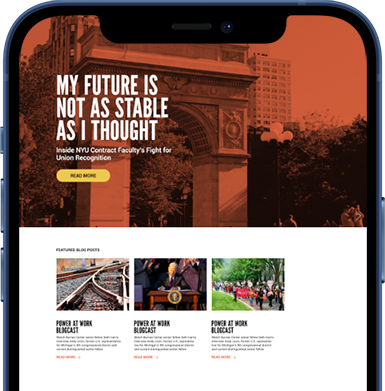This story was originally published in English at Prism.
In the past two years, the Screen Actors Guild-American Federation of Television and Radio Artists (SAG-AFTRA) has gone on strike twice against studios, partially for artificial intelligence (AI) protections. The union’s “surprise” deals with AI companies for voice actors to license “digital voice replicas,” announced this year, led to immediate controversy among voiceover artists who expressed concern and excitement about AI’s future in the industry.
The first deal with Replica Studios was announced in January, on the heels of SAG-AFTRA’s months-long historic strike for writer and actor protections against AI. The second deal, with Narrativ, was announced in August during a strike by video game voice actors for AI protections. The deals come amid a larger crisis concerning SAG-AFTRA leadership, which members have accused of unfair elections, partisan infighting, and unequal treatment of several entertainment worker groups in the past several years.
“I think disappointment is the first word that comes to mind with both announcements,” Amber Warnock-Estrada, a video game journalist and aspiring voice actor, said. “We were all just like, ‘What was the point of the [strikes]?’”
Marcus Rothenberg, a full-time voice actor, echoed Warnock-Estrada’s disappointment. “[The union] didn’t consult their members,” Rothenberg said. “I know people that had never heard anything about this until the deal went through.”
Though Rothenberg is not a member of SAG-AFTRA, they are SAG-eligible, meaning they can join the union at any time. However, the Replica Studios and Narrativ contracts have led Rothenberg to consider Financial Core membership rather than full-member status.
“Unfortunately, these deals have really shaken my faith in the union,” Rothenberg said. “I think this has kind of changed how a lot of us feel about if we want to become full union members now, or if we want to go the Fi-Core route.”

stock.adobe.com - ramcreative
One of Rothenberg’s concerns is that these AI deals might make AI clauses in contracts more standard across the industry, as they’ve already seen them appear in several of their contracts. Rothenberg also expressed fear that AI clauses might make it harder for non-union voice actors to find work if they decided not to consent to AI training in their contracts.
Tim Friedlander, president and co-founder of the National Association of Voice Actors and a member of the SAG-AFTRA AI committee, said the deals were put in place because of AI’s rapidly growing presence in the industry.
“Unfortunately, we don’t have the power to go against Amazon, Google, Microsoft,” Friedlander said. “If they’re going to put this technology into place, we as individual performers or small business owners don’t [or] can’t really do anything about them.”
According to Friedlander, SAG-AFTRA is discussing voice actors’ concerns with AI companies one-on-one and advocating for federal legislation to protect the “voice, image, name, [and] likeness” of industry workers from nonconsensual usage by AI companies. The deals are part of the union’s strategy to control the use of AI in the industry.
However, Friedlander said that it would be hard to know if voice actors working with Replica Studios and Narrativ were training AI with their voices due to difficulty in tracking how voices are used.
“There currently are not protections in place to trace track and monitor a voice, so if it does get sold to one of these companies, it’s not going to be necessarily very easy to get that removed from the marketplace,” Friedlander said.
The rising use of AI in the industry—which many voice actors see as inevitable—has led several voice actors to embrace it instead.

stock.adobe.com - Steve Cukrov
Meggan Anderson, a SAG-AFTRA member and a full-time actor, model, and voice actor, began working with Narrativ shortly after SAG-AFTRA announced the deal. She called the deal a “lucrative passive income for voice actors”—a sentiment echoed by voice actor coach Anne Ganguzza.
“My personal circle of friends, we all seem to be very excited…about any opportunity for an additional job,” Anderson said.
Ganguzza, who has spoken with several AI companies for her VO Boss Podcast, said that she believed many voice actors’ reactions to the SAG-AFTRA AI deals were “fear-based.” Further discussion within voiceover communities, she said, had dispelled some of this fear.
“I think that after that discussion initially got going that a majority of people [began] talking about that it was promising that companies were coming forward and wanting to work with SAG-AFTRA,” Ganguzza said.
Though Anderson and Ganguzza remain optimistic about the usage of AI in the industry, Rothenberg and Warnock-Estrada hope to see AI phased out of the industry entirely, citing concerns regarding a reduction in jobs for voice actors and the subsequent dissolution of voice actor communities. Experts have projected a 30-50% reduction in voice-acting jobs in the next decade due to AI usage in the industry.
Both Rothenberg and Warnock-Estrada said that they support the union, but that they would like to see it—and voice actors—take a hard stance against AI companies.
“More than anything, we want to direct that upset attitude at these [AI] companies,” Warnock-Estrada said. “Because the most predatory thing about them is the way that they’ve targeted the younger generation of people who are just trying to make it.”
Prism is an independent and nonprofit newsroom led by journalists of color. We report from the ground up and at the intersections of injustice.

